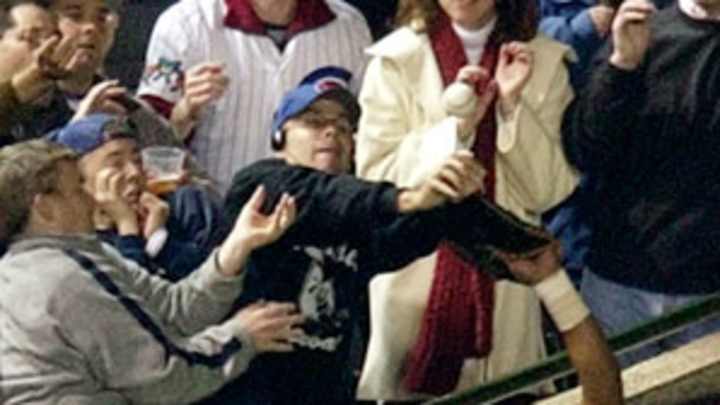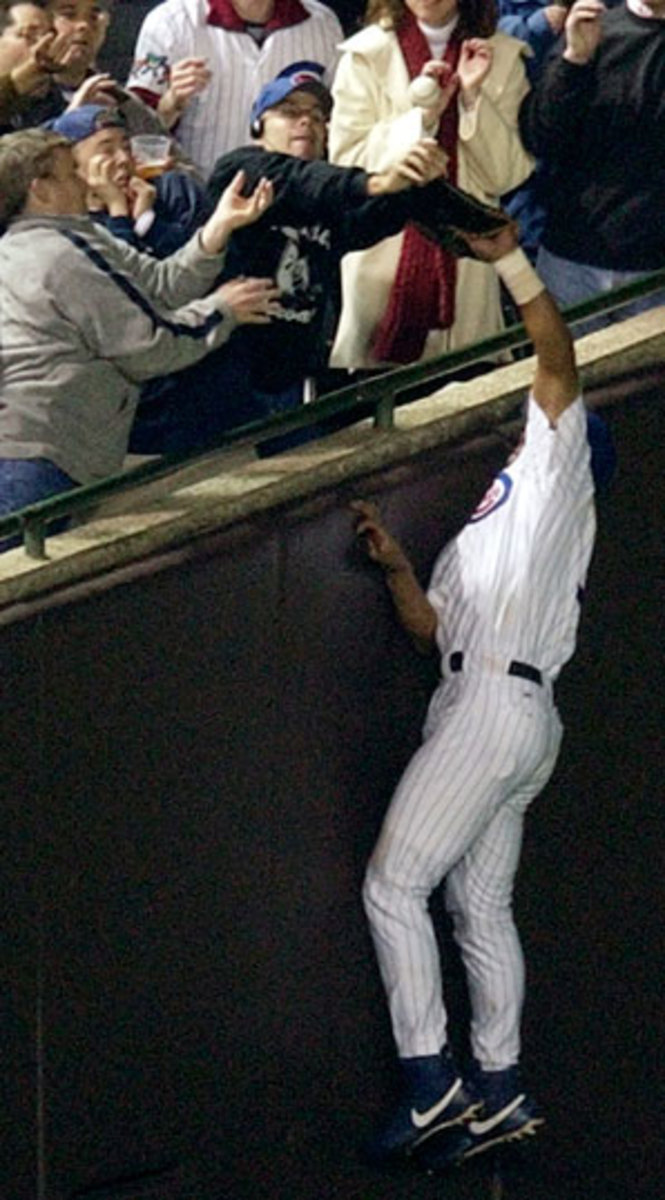A brief history of amazing comebacks from 3-games-to-1 deficits in the LCS

The infamous Bartman play was just one reason the Cubs gave away a 3-games-to-1 lead to the Marlins in the 2003 NLCS.

The Giants staved off elimination yet again on Sunday night, beating the Cardinals 6-1 to force the National League Championship Series to a decisive Game 7. Since the LCS expanded from five games to seven in 1985, eight teams trailing 3-games-to-1 have rallied to extended the series to a seventh game, and six of them won to advance to the World Series, along the way producing some of the most memorable — and infamous — moments in postseason history Here's a look back at those comebacks.
After losing the first two games in Toronto, the Royals narrowly avoided defeat in Game 3 at home, clawing their way back from a 5-2 deficit that saw ace Bret Saberhagen chased early. They looked cooked when the Jays rallied for three ninth-inning runs against tiring starter Charlie Liebrandt and closer Dan Quisenberry in Game 4, but stayed alive to send the series back to Toronto behind Danny Jackson's eight-hit shutout in Game 5. George Brett's homer off Doyle Alexander — his third of the series — broke a 2-2 tie in Game 6 en route to a 5-3 win, and Jim Sundberg's bases-loaded triple off Dave Stieb broke open Game 7, with Liebrandt throwing 5 1/3 innings in relief of Saberhagen. Brett won ALCS MVP honors by hitting .348/.500/.826 with three homers and five extra-base hits in 30 plate appearances.
The Royals would go on to win the World Series over the Cardinals by overcoming a 3-1 deficit there as well, though that accomplishment has largely been overshadowed by umpire Don Denkinger's blown call in the bottom of the ninth inning of Game 6, helping Kansas City turn a 1-0 deficit into a 2-1 win.
One of the wildest postseasons in memory started with a comeback that is today overshadowed by one of the biggest gaffes in the game's history. After splitting the first two games in Boston, the Angels went up 3-games-to-1 at home after overcoming a 3-0 ninth-inning deficit against Roger Clemens and Calvin Schiraldi, then scoring the winning run off Schiraldi via a Bobby Grich single in the 11th. The Angels carried a 5-2 lead into the ninth inning of Game 5, but Don Baylor's two-run homer off starter Mike Witt closed the gap, and Dave Henderson's two-run homer off closer Donnie Moore gave the Red Sox the lead after Boston had been down to its last strike. The Angels scored in the bottom of the inning to force the game into extras, but Henderson's sacrifice fly off Moore in the 11th provided the margin of victory . The series headed back to Boston, where the Sox won a pair of routs, 10-4 and 8-1, to advance.
The Red Sox went on to face the Mets in the World Series, and they themselves would be one pitch away from clinching in Game 6. Boston led 5-3 going to the bottom of the 10th, but Bob Stanley's wild pitch and Bill Buckner's failure to stop Mookie Wilson's groundball turned a 5-4 lead into a 6-5 loss. The Red Sox then lost Game 7 after holding a 3-0 lead with 12 outs to go.
1996 Braves over Cards
After rallying for four runs in the late innings of Game 4, the Cardinals had a chance to close out the series at home, and while the Braves had a trio of Cooperstown-bound hurlers lined up to face them, it was their offense that carried them to victory. In Game 5, St. Louis starter Todd Stottlemyre was torched for seven runs while retiring just three out of the 12 hitters he faced, with Chipper Jones driving in three via a two-run first-inning double and a second-inning single. Backed by seven shutout innings from John Smoltz, the Braves won going away, 14-0, to send the series back to Atlanta. Greg Maddux and Mark Wohlers combined to hold the Cardinals to one run in Game 6, and then the Braves jumped all over St. Louis starter Donovan Osborne for six first-inning runs in Game 7, with Tom Glavine's two-run triple the coup de grace. Fred McGriff, series MVP Javy Lopez and 19-year-old rookie Andruw Jones all homered and combined to drive in 10 runs, while Glavine threw seven shutout innings in a 15-0 romp; the cumulative score over the last three games was 32-1.
The Braves went on to face the Yankees in the World Series, and after winning the first two games on the road by a combined margin of 16-1, the defending world champions looked virtually unbeatable. Alas, they lost the next four, three in Atlanta, and one in New York and have not won a World Series since.
2003 Marlins over Cubs
This series is best remembered for the role played by innocent bystander Steve Bartman in Game 6, but to get to the point where cruel fate intervened, the Cubs split the first two at Wrigley Field, and took the first two in Miami before being blanked on two hits by Josh Beckett in Game 5. The series returned to the Friendly Confines, and the Cubs cruised into the eighth inning with a 3-0 lead and Mark Prior on the hill. After retiring the first hitter — putting the Cubs five outs away from their first pennant since 1945 — all hell broke loose. Juan Pierre doubled, and then Luis Castillo hit a fly ball into foul territory in leftfield, where Bartman reached for the ball, deflecting it before leftfielder Moises Alou could glove it for the second out. Castillo wound up working a walk, the next three hitters reached base to tie the game and chase Prior, and by the time the smoke had cleared, the Marlins had scored eight runs to force the finale. Miguel Cabrera hit a three run homer off Cubs starter Kerry Wood in the first inning of Game 7, but Wood himself hit a two-run homer to tie it in the second inning, and the Cubs took a 5-3 lead on an Alou homer in the third. Alas, the Marlins pushed three over against a tiring Wood in the fifth, and the Marlins went on to win 9-6. They would go on to beat the Yankees in the World Series.
2004 Red Sox over Yankees
A year after they were eliminated by Aaron Boone's 11th inning home run in Game 7 of the ALCS, the Red Sox not only came back from 3-1, they became the first team in major league history to dig out of a 3-0 series hole, which they had created by losing the first two in the Bronx and then by sustaining a 19-8 drubbing at Fenway Park in Game 3. The Yankees were three outs away from a sweep when Mariano Rivera issued a ninth inning leadoff walk to Kevin Millar, who yielded to pinch-runner Dave Roberts, who stole second and came around to score on Bill Mueller's single; the Sox won it in the 12th when David Ortiz homered off Paul Quantrill. The Yankees were six outs away from clinching in Game 5 when Tom Gordon yielded a leadoff solo homer to cut a two-run deficit in half; he departed after allowing a walk and a single, with the Sox tying the game on Jason Varitek's sacrifice fly off Rivera. The Sox went on to win in 14 innings when Ortiz plated Johnny Damon with a single off Esteban Loaiza.
The series shifted to the Bronx, where Curt Schilling held the Yankees to one run in seven innings in the infamous "Bloody Sock" game. The right-hander had undergone a surgical procedure to stabilize a tendon in his ankle after the tendon sheath had ruptured; somehow, the Yankees never challenged him by bunting. Game 7 quickly became a laugher as Ortiz smacked a two-run homer off Kevin Brown in the first inning and Damon added a grand slam in the second. The Sox won 10-3, then went on to sweep the Cardinals in the World Series for their first championship since 1918.
2007 Red Sox over Indians
Three years after engineering the ultimate comeback, the Red Sox returned from the brink yet again. After the Indians split at Fenway, they took the first two games at Jacobs Field, setting up a Game 5 between aces CC Sabathia and Beckett. The Sox led 2-1 going into the seventh inning when they broke the game open, with Kevin Youkilis, who had homered off Sabathia in the first, hitting an RBI triple; they would go on to win 7-1. Back at Fenway, Boston pummeled Cleveland 12-2 in Game 6, with J.D. Drew hitting a grand slam off starter Fausto Carmona in the first, then chasing him with an RBI single in the third; by the time that inning ended, the Red Sox had a 10-1 lead, more than enough cushion for Schilling, who threw seven strong innings. Game 7, pitting Jake Westbrook for the Indians and Daisuke Matsuzaka for the Red Sox, stayed close into the seventh, when the Red Sox padded a 3-2 lead via a two-run homer by Dustin Pedroia. The Sox finished off the Indians with a six-run eighth, then went on to sweep the Rockies in the World Series for their second title in four years.
Two other times a team down 3-1 forced a seventh game but couldn't finish the job. The 1992 Pirates, managed by current Tigers skipper Jim Leyland, chased the Braves' Steve Avery in the first inning of Game 5 in Pittsburgh and Glavine in the second inning of Game 6 in Atlanta; they carried a 2-0 lead into the ninth inning of Game 7, but the Braves rallied for three runs against starter Doug Drabek and reliever Stan Belinda, capped by Francisco Cabrera's two-out, two-run pinch single. The 2008 Red Sox overcame a 7-0 Rays lead over the final three innings in Game 5 at Fenway, and won 4-2 in Game 6 in Tampa Bay before falling 3-1 in Game 7, as Matt Garza and four relievers limited the Sox to just two hits and no runs following Pedroia's first-inning homer.
